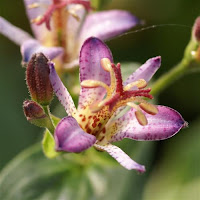natsu no yo no
fusu ka to sureba
hototoguisu
naku hitokoe ni
akuru shinonome
On a summer night,
no sooner have I lain down
than the first faint light
of dawn appears -- heralded
by a cuckoo's single song
ほととぎす
The hototogisu is a kind of Japanese cuckoo (Cuculus poliocephalus). The song of the hototogisu traditionally signaled the arrival of summer. In other tales, the mournful cry of a hototogisu in a lonely wood was associated with the longing of the spirits of the dead to return to their loved ones still living. The hototogisu has long been a popular subject in Japanese literature and poetry, making appearances in both The Tale of Genji and The Pillow Book, and practically comprising an entire genre of hototogisu haiku. It is a convenient word in that it contians 5 syllables and when you add yama(mountain) it comprises 7 syllables.When the poet Masaoka Shiki was 16, he went to Tokyo to study literature at the best university in the country. He was admitted in 1890, but suddenly became ill at the age of 23. He was diagnosed with lung disease. That night he wrote the following haiku:
It seems to me as if
A little cuckoo could have come flying
To aim at deutzia flowers
A little cuckoo could have come flying
To aim at deutzia flowers
The hototogisu was said to spit blood when chirping - a synonym of tuberculosis. Since his diagnosis, he used his pen name, Shiki. Shiki is another name for hototogisu, meaning "little cuckoo". He founded the literary magazine Hototogisu and patron to a number of young poets, Shiki played a leading role in the revival of the traditional waka and haiku forms. He advocated a realistic, descriptive poetic style, which he regarded as the original spirit of Japanese verse, and his poetic treatises greatly influenced the Japanese literary world in its quest to define modern Japanese modes of expression.
There are no less than nine ways to write "hototogisu" using Japanese kanji, only some of which have meanings that actually reflect the bird they name:
杜鵑, "woods cuckoo"
子規, "egg measuring" (may suggest the bird's practice of laying eggs in the nest of other birds)
時鳥, "bird of time"
不如帰, "homelessness"
蜀魂, "spirit of Szechuan"
霍公鳥, "speedy cuckoo bird"
田鵑, "rice field cuckoo"
沓手鳥, "shoe hand bird"
杜宇, "woods' roof"


No comments:
Post a Comment